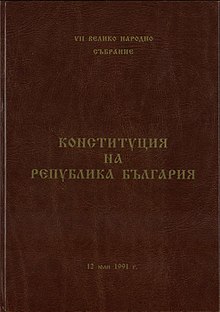
The politics of Bulgaria take place in a framework of a parliamentary representative democratic republic, whereby the prime minister is the head of government, and of a multi-party system. Executive power is exercised by the government. Legislative power is vested in both the government and the National Assembly. The Judiciary is independent of the executive and the legislature.

The National Assembly was the authoritative legislative body of the Republic of China, from 1947 to 2005. Along with the Control Yuan and the Legislative Yuan, the National Assembly formed the tricameral parliament of the Republic of China.
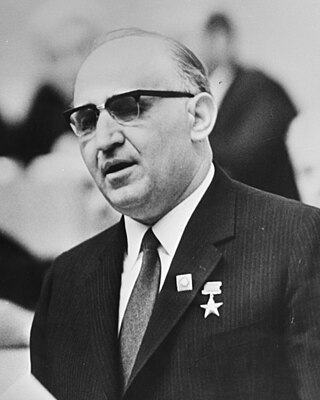
Todor Hristov Zhivkov was a Bulgarian communist statesman who served as the de facto leader of the People's Republic of Bulgaria (PRB) from 1954 until 1989 as General Secretary of the Bulgarian Communist Party. He was the second longest-serving leader in the Eastern Bloc, the longest-serving leader within the Warsaw Pact and the longest-serving non-royal ruler in Bulgarian history.

The National Assembly is the unicameral parliament and legislative body of the Republic of Bulgaria. The first National Assembly was established in 1879 with the Tarnovo Constitution.
The Green Party is an environmentalist political party in Bulgaria. It was founded in Sofia in 1989 by Aleksandar Karakachanov, who later went on to become the chairperson of the party.
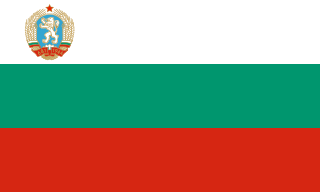
The People's Republic of Bulgaria was the official name of Bulgaria when it was a socialist republic from 1946 to 1990, ruled by the Bulgarian Communist Party (BCP) together with its coalition partner, the Bulgarian Agrarian People's Union. Bulgaria was closely allied and one of the most loyal satellite states of the Soviet Union during the Cold War, sometimes being called the 16th Soviet Republic rather than an independent country. Bulgaria was also part of Comecon as well as a member of the Warsaw Pact. The Bulgarian resistance movement during World War II deposed the Tsardom of Bulgaria administration in the Bulgarian coup d'état of 1944 which ended the country's alliance with the Axis powers and led to the People's Republic in 1946.
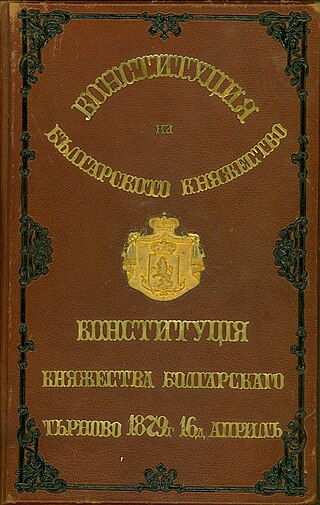
The Tarnovo Constitution was the first constitution of Bulgaria.
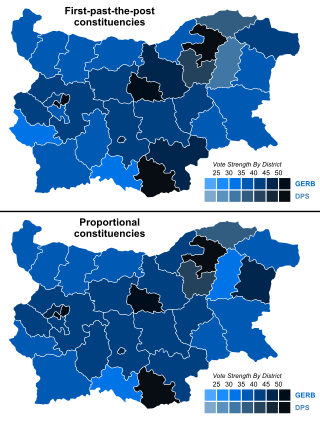
Parliamentary elections were held in Bulgaria on 5 July 2009. With 40% of the vote, the decisive winner of the elections was the established in 2006 personalistic party of Boyko Borisov, GERB. The Socialist Party, in power before the election, was in second place, with around 18%. Оnce-ruling National Movement Simeon II did not cross the 4% threshold and won no seats. The turnout was 60.6%, one of the lowest ever. Following the election, GERB leader Boyko Borisov became prime minister. Just like all the previous parliamentary elections since the fall of communism, the government was not re-elected.

Tsvetan Genchev Tsvetanov is a Bulgarian politician and former government official. He served as the chairman of the GERB party until 2009. On 8 July 2009, following his party's victory in the 2009 parliamentary election, he was designated by de facto party leader Boyko Borisov as the future Minister of the Interior.

The Zhivkov Constitution was the third Constitution of Bulgaria, and the second of the Communist era. It was in effect from May 18, 1971 to July 12, 1991.

Ivan Yordanov Kostov is a Bulgarian politician who served as Prime Minister of Bulgaria from 1997 to 2001. A member of the SDS party, which he led from 1994 to 2001, he was previously Minister of Finance from 1990 to 1992. Following his premiership, Kostov founded a new political party, the DSB, and served as Member of the National Assembly from 2001 to 2013.

Delyan Slavchev Peevski is a Bulgarian politician and oligarch, sanctioned by the Global Magnitsky Act, by the UK and the United States for corruption, bribery and embezzlement. He is also a former media mogul and has served as Member of the National Assembly of Bulgaria since 2009. A member of the DPS party, which he currently leads, Peevski was elected as the Director of the State Agency for National Security in 2013, which triggered long lasting national protests that led to his eventual resignation.
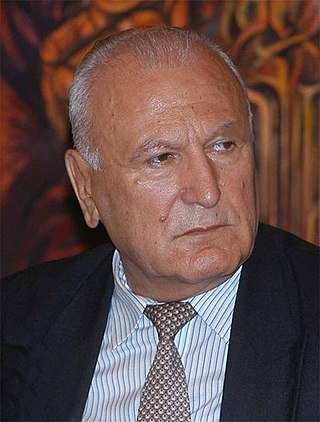
Aleksandar Vasilev Lilov was a Bulgarian politician and philosopher. At his career's height during the People's Republic of Bulgaria, he was described as the second most powerful man of the regime; however, he fell out of favor in 1983 and lost his power. He made a strong political comeback during the democratic transition and was elected chairman of the Bulgarian Communist Party. He led the party to transform and adapt to the post-Communist era. A party referendum supported his proposal to change the name to the Bulgarian Socialist Party.

The Chairman (President) of the Republic of the People's Republic of Bulgaria was the head of state of Bulgaria from 3 April 1990 to 22 January 1992. The office was known as the Chairman (President) of the People's Republic of Bulgaria until the word "People's" was dropped from the country's name on 15 November 1990. From that point on, the office was simply the Chairman (President) of the Republic of Bulgaria.

A constitutional referendum was held in Armenia on 6 December 2015. Its amendments to the constitution put the country on a course from having a semi-presidential system to being a parliamentary republic, with the changes beginning to take place during the 2017–18 electoral cycle. The referendum passed with 66% of voters supporting it. Voter turnout was 51%, passing the 33% threshold to validate the results.
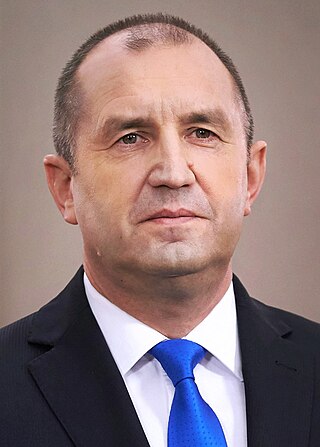
Rumen Georgiev Radev is a Bulgarian politician and former major general who has been the president of Bulgaria since 22 January 2017.

Zlatko Sofroniev Zhivkov is a Bulgarian politician. He has been the mayor of the Montana Municipality since 1999.
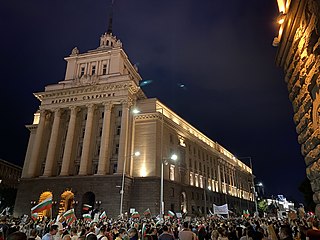
The 2020–2021 Bulgarian protests were a series of demonstrations that were being held in Bulgaria, mainly in the capital Sofia, as well as cities with a large Bulgarian diaspora, such as Brussels, Paris, Madrid, Barcelona, Berlin and London. The protest movement was the culmination of long-standing grievances against endemic corruption and state capture, particularly associated with prime minister Boyko Borisov's governments, in power since 2016.

Early parliamentary elections were held in Bulgaria on 9 June 2024, to elect members of the National Assembly. The election coincided with the European Parliament election on the same day.

Snap parliamentary elections were held in Bulgaria on 27 October 2024, after all three attempts to form a government following the latest June 2024 elections failed. This was the country's sixth snap election since 2021. This series of snap elections is the result of a political crisis affecting the country.
